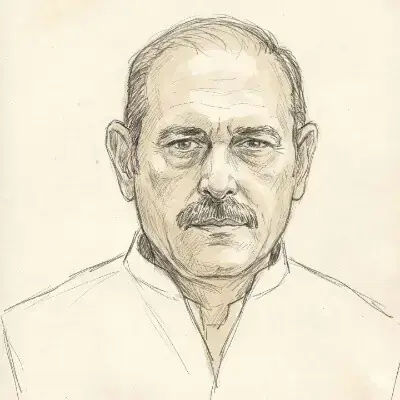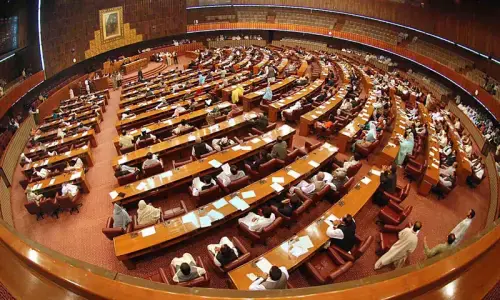PESHAWAR: National Database and Registration Authority (Nadra) officials in Peshawar issued Computerised National Identity Cards (CNICs) to Afghan woman Sharbat Bibi and two men who are said to be her sons, official documents reveal.
Sources at Nadra’s Hayatabad office told Dawn that high-ups in the Nadra issued three CNICs on a single day last year to the 46-year-old Sharbat Bibi, wife of Rehmat Gul, and her two sons Rauf Khan and Wali Khan in violation of rules and regulations.
"These people are so powerful; I don’t know whether they have money or connections but they got three CNICs in one day," said a Nadra source.
 |
| Men identified by Nadra as Sharbat Bibi's sons Wali Khan (L) and Rauf Khan (R). |
In 1984, Sharbat moved to Peshawar along with her two sons and since then, she has been residing in the Nasir Bagh camp established for Afghan refugees. Earlier reports had said that Sharbat has three daughters. This is in contrast with the information on the Nadra form which maintains that she has two sons.
"They may not be her sons but this is a common practice among Afghan refugees whereby they list names of non-relatives as their children to obtain documents," said a Nadra source.
In her CNIC form filed on April 17, 2014, the ‘Afghan Girl’ listed herself to have been born in Peshawar on Jan 1, 1969, residing at Talab Road, Nauthia Qadeem, Mohallah Mast Gul, Peshawar.
"She lives here. We travel between Pakistan and Afghanistan depending on the security situation," said one of her relatives while speaking to Dawn.
The CNIC number, shown in the form to have been issued to her husband Rahmat Gul, was also fake. Even the attestation signature and stamp of the senior school teacher, Younas Khan, has been found to be fake.
Jamilur Rehman, principal of the Government Higher Secondary School, No. 1, Peshawar City, said there was no Grade-16 SCT teacher by this name in the school.
Nadra issued her a CNIC and officials privy to the development say no one at the time bothered to look at the form to see that there was family tree, no names of the parents or their CNIC numbers. “It does not happen this way”, an official acknowledged, requesting he not be named because he was not authorised to speak to media.
“Every entry in that form was false and fake. It was so obvious,” another official said. “There was no cross-check and no verification,” the official admitted.
 |
Months later, Nadra’s vigilance department woke up to discover the documents to be fake and ordered cancellation of CNICs of Sharbat and her alleged sons.
An inquiry has been launched at Nadra with officials under fire for issuing CNICs to foreign nationals without legitimate documentation. When contacted, Nadra officials, refused to comment on the matter.
It is unclear how long Sharbat has been in Pakistan or if she is a registered Afghan refugee.
Read: Afghan refugees — the usual suspects
Registered Afghan refugees in Pakistan can obtain Proof of Registration (PoR) documentation.
However, it is unlawful to issue a CNIC card to Afghan nationals without adequate documentation and procedure to acquire Pakistani nationality. Last month, an accountability court sentenced two assistant directors of the Nadra to seven-year jail term for issuing bogus CNICs to Afghan refugees.
 |
'Mona Lisa of Afghan war'
Sharbat Bibi became famously known as the 'Afghan Girl' when National Geographic photographer Steve McCurry captured her photograph at the Nasir Bagh refugee camp situated on the edge of Peshawar in 1984 and identified her as Sharbat Gula.
She gained worldwide recognition when her image was featured on the cover of the June 1985 issue of National Geographic Magazine at a time when she was approximately 12 years old.
That photo has been likened with Leonardo Da Vinci's Mona Lisa.
 |
| Sharbat Bibi. |
National Geographic also made a short documentary about her life and dubbed her the ‘Mona Lisa of Afghan war’.
Take a look: Afghan Girl
She remained anonymous for years after her first photo made her an icon around the world and until she was discovered by National Geographic in 2002.
 |
After Sharbat's family granted her permission to meet with the man who photographed her 17 years ago, McCurry knew immediately, even after so many years, that he had found her again.
"Her eyes are as haunting now as they were then," he had said.
Editorial: Fate of Afghan refugees
Pakistan has been tackling the Afghan refugee crisis for over three decades; the UNHCR has acknowledged it as the “largest protracted refugee situation globally”.
This newspaper believes that repatriation should be voluntary — keeping in mind that without peace in war-torn Afghanistan, the refugees may not want to return. While the UN and those countries that have been militarily involved in Afghanistan must support Pakistan’s efforts to care for the displaced Afghans, there are steps authorities within the country can take to mitigate the problem.
For one, better border management is needed as currently, individuals can slip into Pakistan without much hindrance. People have been known to take money offered by the UN, leave for Afghanistan and soon find their way back to Pakistan. Additionally, there has been no coherent refugee policy at the national level, which is hampering efforts to effectively address the problem.
Earlier this week: Stop forceful return of Afghan refugees from Pakistan, says HRW
The Human Rights Watch (HRW) recently spoke against the forceful return of Afghanistan refugees from Pakistan, reminding the government of their obligation to protect all Afghans in the country, including those not registered as refugees.
The recent increase in the repatriation of refugees seem to indicate that the have been coerced into leaving by the local authorities, claimed HRW in a statement on Sunday.
Since the attack on the Army Public School in Peshawar, there has been notable rise in Afghan refugees leaving the country. According to the UN refugee agency (UNHCR), nine times as many Afghan refugees repatriated from Pakistan in January 2015 than in December 2014.































